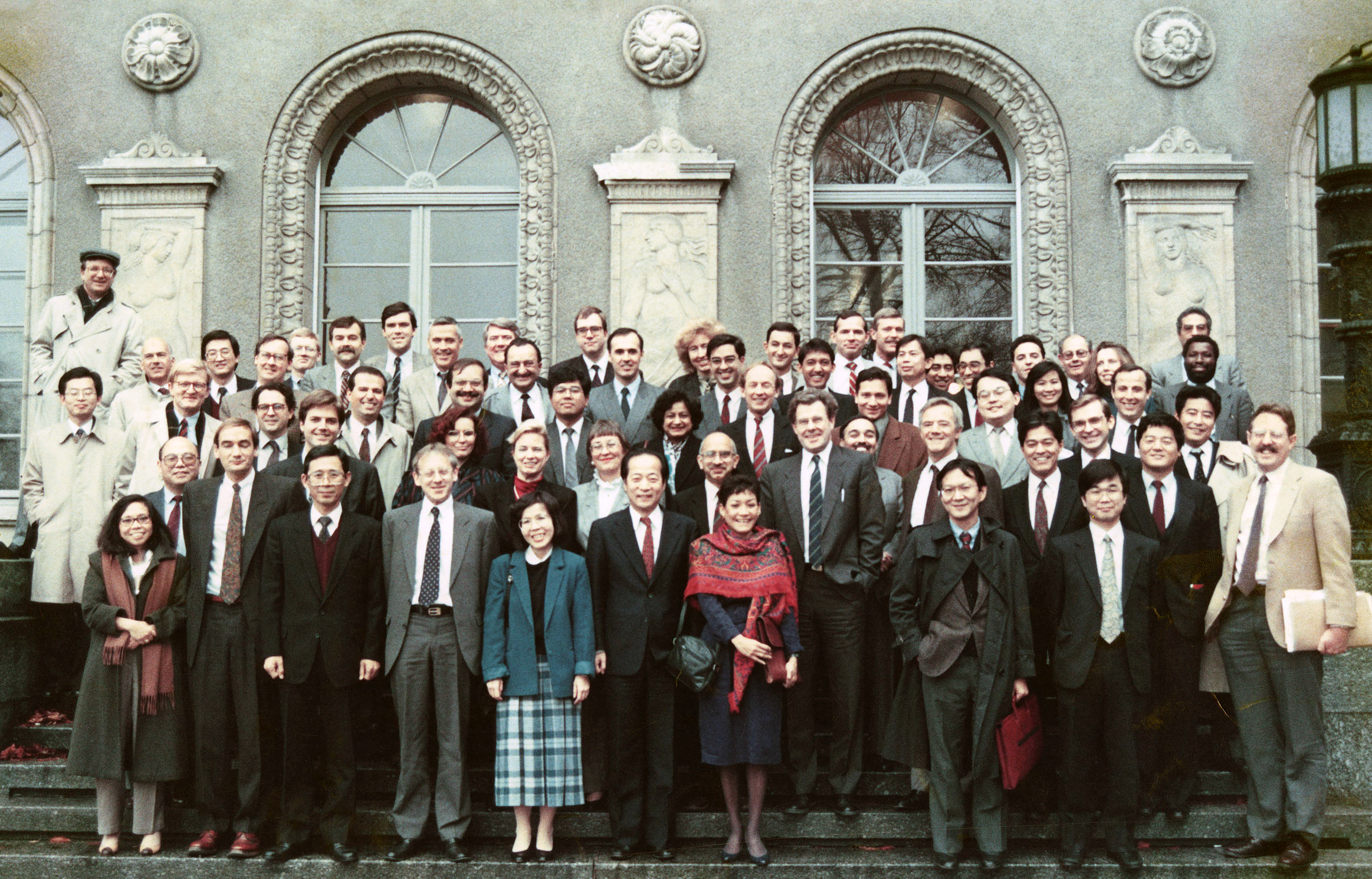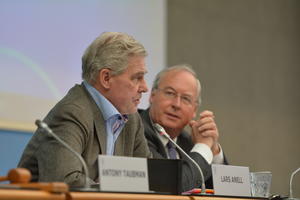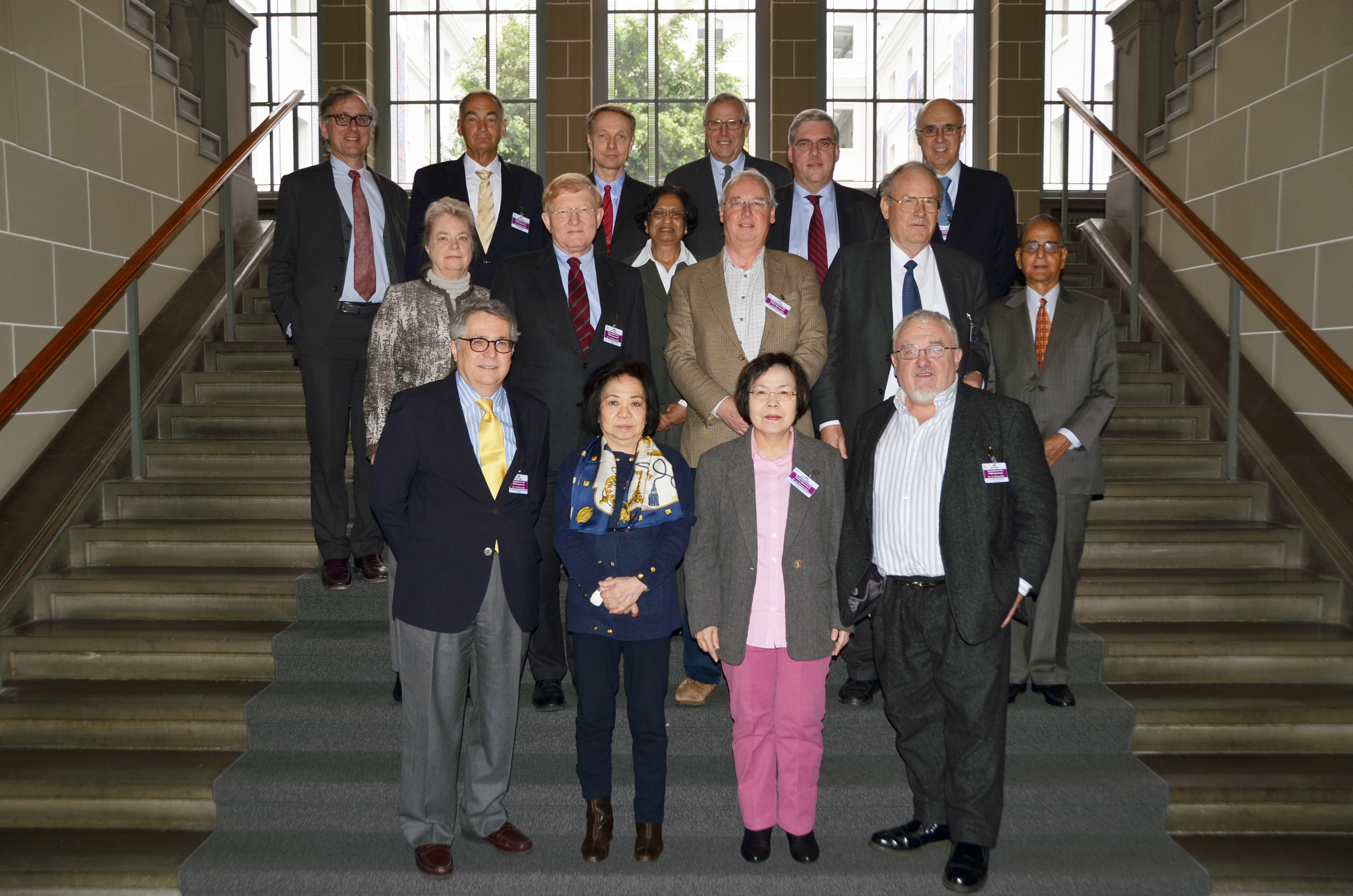As part of the World Trade Organization’s (WTO) technical assistance and capacity building program, on Thursday, 26 February 2015, the WTO Secretariat convened a Symposium on the TRIPS Agreement for TRIPS Council Members and Observers which brought together negotiators from the 1986–94 Uruguay Round to discuss how the Round introduced intellectual property norms into the architecture of the multilateral trading system. In addition, other experts were brought in to discuss what has happened since the introduction of the TRIPS Agreement, and what augurs for the future.

The remarkable cast of characters WTO invited to present there views included: Lars Annell (author of the Anell Draft and former Ambassador of Sweden to the GATT, Chairman of the Uruguay Round Negotiating Group on TRIPS [1]), Adrian Otten, former Director, Intellectual Property Division, WTO, Mogens Peter Carl, Former Director General in the European Commission, DG Trade, DG Environment (negotiator for the EU), Peter Po Tak Cheung, Consultant, Hong Kong, China/David Fitzpatrick, Barrister England and Wales and Hong Kong, China, (negotiators for Hong Kong, China), Thomas Cottier, Director World Trade Institute, Bern/Thu Lang Tran Wasescha, Consultant (negotiators for Switzerland, Catherine Field, former Deputy General Counsel at the Office of the U.S. Trade Representative, (negotiator for the US) A.V. Ganesan, former Commerce Secretary, Government of India/Jayashree Watal, Counsellor, Intellectual Property Division (negotiators for India), John Gero, former Ambassador of Canada to the WTO (negotiator for Canada), Adrian Macey, former Ambassador for Climate Change, government of New Zealand and now Senior Associate, Institute for Governance and Policy Studies, Victoria University of Wellington (negotiator for New Zealand), Umi Kalthum Binti Abdul Majid, Judge in Court of Appeals, Malaysia (negotiator for Malaysia) Piragibe dos Santos Tarragô, the Permanent Representative of the Federative Republic of Brazil to the Organization for the Prohibition of Chemical Weapons, The Hague (negotiator for Brazil), Antonio Gustavo Trombetta, Ambassador of Argentina to Switzerland (negotiator for Argentina) and Hannu Wager, Counsellor, Intellectual Property Division (negotiator for the Nordics). Additional experts included Felix Maonera, Deputy Head, Geneva Office, Secretariat of the African Caribbean and Pacific (negotiator for Zimbabwe during the paragraph 6 negotiations), Keith Maskus, University of Colorado, Marco Aleman, WIPO, Roger Kampf, Counsellor, Intellectual Property Division, Carlos Primo Braga, the Evian Group, Prof Li Mingde, Chinese Academy of Social Sciences, P. R. China and Paulin Edou Edou, African Intellectual Property Organisation (OAPI).
The agenda and the presentations for the TRIPS symposium can be found here: [2] https://www.wto.org/english/tratop_e/trips_e/symp_prog_20feb15_e.htm

Adrian Otten, former director of the WTO’s Intellectual Property Division presented an Overview of the Stages of TRIPS Negotiations”. In his first slide, Otten noted that the General Agreement on Tariffs and Trade (GATT) contained few provisions on IP. The GATT articles related to IP included,
- Some to prevent trade rules standing in way of IP enforcement and procedures (Arts. XX(d); XII:3(c)(iii); XVIII:10)
- Some to ensure IP rules not unnecessarily discriminate against imported goods or constitute a disguised restriction on trade (Art. III:4 and conditions to Art. XX(d))
- Cooperation on the protection of distinctive regional or geographical names (Article IX:6)
In describing the evolution of the mandate for the Uruguay Round, Otten noted the development of “US proposals”, the 1984 revision of Section 301, the 1986 Spring OECD Ministerial and the September 1986 Punta Decision. One wonders if Otten’s presentation mentioned the role of the industry led “Intellectual Property Committee, a coalition of 13 US multinationals including Bristol-Myers, DuPont, FMC Corporation, General Electric, General Motors, Hewlett-Packard, IBM, Johnson & Johnson, Merck, Monsanto, Pfizer, Rockwell International and Warner Communications in framing the US demands during the Uruguay Round (Source: Peter Drahos, Expanding Intellectual Property’s Empire: the Role of FTAs [3], ICTSD, 2003).
In his slide on the Uruguay Round TRIPS Mandate, Otten presented the following:
URUGUAY ROUND TRIPS MANDATE
(in Trade in Goods part)In order to reduce the distortions and impediments to international trade, and taking into account the need to promote effective and adequate protection of intellectual property rights, and to ensure that measures and procedures to enforce intellectual property rights do
not themselves become barriers to legitimate trade, the negotiations shall aim to clarify GATT provisions and elaborate as appropriate new rules and disciplines.Negotiations shall aim to develop a multilateral framework of principles, rules and disciplines dealing with international trade in counterfeit goods, taking into account work already undertaken in the GATT.
These negotiations shall be without prejudice to other complementary initiatives that may be taken in the World Intellectual Property Organization and elsewhere to deal with these matters.
In the period from 1986-1988, Otten noted the following developments arising from the work of the Uruguay Round Negotiating Group:
WORK OF URUGUAY ROUND NEGOTIATING GROUP 1986-1988
- 1986-88. Submission of issues and concerns. Debate on interpretation of mandate
- Dec.1988 Montreal “mid-term” Ministerial. No agreement on TRIPS, agriculture, safeguards and textiles
- April 1989. Mid-term review decision
Otten detailed the terms of the Montreal “mid-term” Ministerial Decision:
TRIPS MID-TERM REVIEW DECISION
3. Ministers agree that the outcome of the negotiations is not prejudged and that these negotiations are without prejudice to the views of participants concerning the institutional aspects of the international implementation of the results of the negotiations in this area, which is to be decided pursuant to the final paragraph of the Punta del Este Declaration.
4. Ministers agree that negotiations on this subject shall continue in the Uruguay Round and shall encompass the following issues:
(a) the applicability of the basic principles of the GATT and of relevant international intellectual property agreements or conventions;
(b) the provision of adequate standards and principles concerning the availability, scope and use of trade-related intellectual property rights;
(c) the provision of effective and appropriate means for the enforcement of trade-related intellectual property rights, taking into account differences in national legal systems;
(d) the provision of effective and expeditious procedures for the multilateral prevention and settlement of disputes between governments, including the applicability of GATT procedures;
(e) transitional arrangements aiming at the fullest participation in the results of the negotiations.
5. Ministers agree that in the negotiations consideration will be given to concerns raised by participants related to the underlying public policy objectives of their national systems for the protection of intellectual property, including developmental and technological objectives.
6. In respect of 4(d) above, Ministers emphasise the importance of reducing tensions in this area by reaching strengthened commitments to resolve disputes on trade-related intellectual property issues through multilateral procedures.
By the time of the Brussels Ministerial in 1990, Otten noted the following elements which had yet to be resolved including patents, undisclosed information, copyright, geographical indications and transition period.
BRUSSELS MINISTERIAL 1990
• TRIPS text sent to Brussels (MTN.TNC/W/35/Rev.1).
Common language for large parts, but:
– Two approaches to GATTability
– Dispute settlement
– About 25 other issues outstanding, mainly:
– patents/undisclosed information
– copyright
– GIs
– transition periods• Work in Brussels
• Breakdown – agriculture
Otten noted that the TRIPS negotiations in autumn 1991 focused on complex matters related to patents including scope, exceptions from patentability, compulsory licensing, government use, exhaustion, term, protection of test data, transition periods and the protection of existing subject matter.
TRIPS NEGOTIATIONS AUTUMN 1991
- Patent complex – scope and timing of rights
- exceptions from patentability
- compulsory licensing/government use
- exhaustion
- term
- protection of test data
- transition periods
- protection of existing subject-matter (Art. 70)
- GATTability question and MTO/WTO
- Draft Final Act, 20 December 1991 (MTN.TNC/W/FA)
Otten’s final slide dealt with the following:
TRIPS NEGOTIATIONS AUTUMN 1993
• Proposals for changes to Draft Final Act
– compulsory licensing of semiconductor technology (Art.31(c))• Non-violation dispute settlement cases (Art.64)
